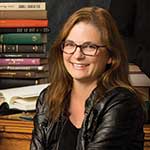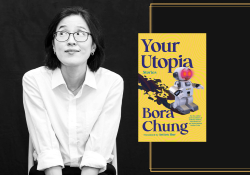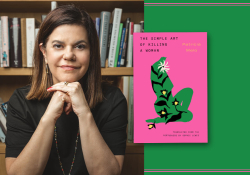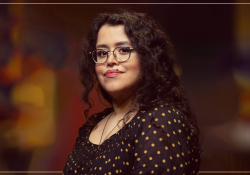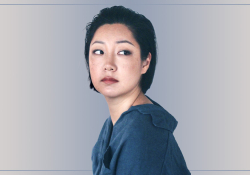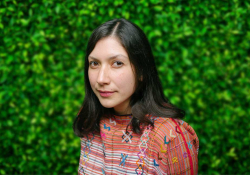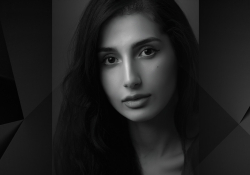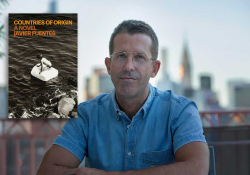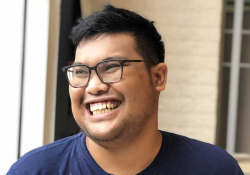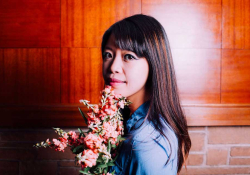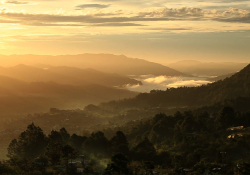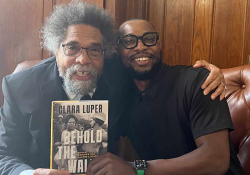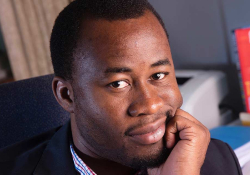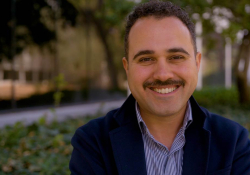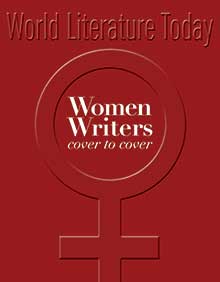“Always and Everywhere a Book Is Waiting for Me”: A Conversation with Lidija Dimkovska
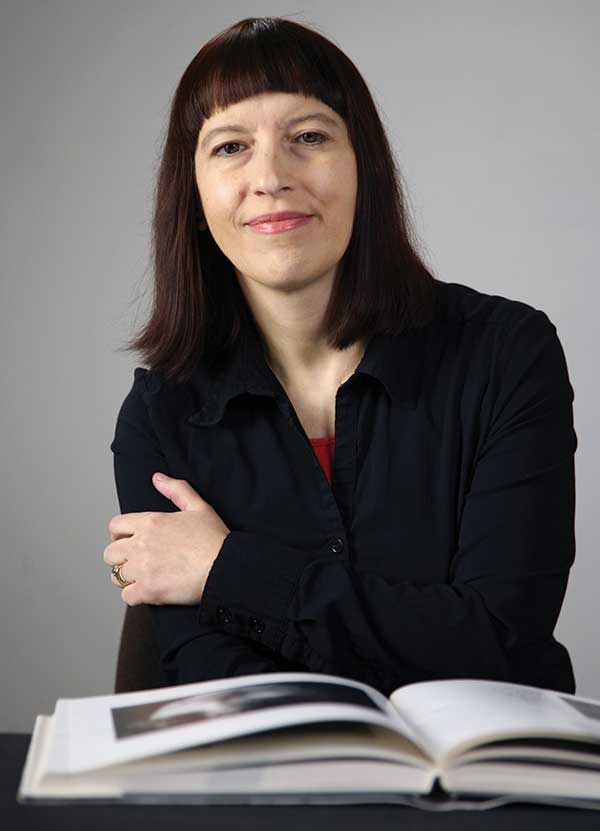
It’s 1984 and two twelve-year-old sisters are playing a sidewalk game in communist Yugoslavia, only these sisters are unique: they are conjoined twins, joined at their heads. And so begins Lidija Dimkovska’s epic novel of two impoverished sisters and their desire to separate, set against the separation of the Yugoslav republics and other world events over the next twenty-eight years. Both a political novel and a coming-of-age story, comprehensive as well as creative, A Spare Life is an engrossing read that won the 2013 European Union Prize for Literature.
Like her narrator, Zlata, and Zlata’s twin, Srebra, Dimkovska is a member of the lost generation of the 1970s, and like them, she grew up in Skopje, where most of the novel takes place. The plot also develops in London, where the twins seek treatment and Zlata studies émigré writers and falls in love.
Here Dimkovska talks with WLT’s managing editor about writing Yugoslavia’s disintegration, Macedonia’s current bid for entry into the European Union, books, God, and finding relief in art.
Michelle Johnson: The conjoined twins work as the perfect metaphor for this period of separation throughout former Yugoslavia. How did you think of them?
Lidija Dimkovska: The disintegration of Yugoslavia was one of the contexts of the novel and is a metaphor for the separation of both conjoined republics and Zlata and Srebra’s heads. Both the conjoined republics and the main characters in my novel are searching for their own identities, individuality, and own life. Not only in mythology but also in the real life, each separation often requires sacrifice, and often somebody/something dies, literally or symbolically, because of the separation. The tragedy in ex-Yugoslavia was not so much the separation as it was the republics–the tragedy was that the separation happened in the most primitive, rude, and bloody way possible: with wars between people who used to live together, with rapes, violence, killings, concentration camps. After World War II, nothing similar happened in Europe until the war in ex-Yugoslavia. Who could ever imagine that Srebrenica, Sarajevo, Knin, Vukovar, etc. could happen? With peace and democracy, the separation between the republics in ex-Yugoslavia could have been an expression of democracy and maturity.
The tragedy in ex-Yugoslavia was not so much the separation as it was the republics–the tragedy was that the separation happened in the most primitive, rude, and bloody way possible.
My novel is dedicated primarily to my generation of people born in the seventies, a generation caught up in the historical, political, and local and global changes happening around them and in the entire world. It covers the period from 1984 to 2012. I tried to write a history of personal and collective growth in the former Yugoslavia, the changes that marked my generation of people born in the seventies and the long transition in every sense: both ontological and existential, political, physical, and spiritual.
MJ: Might you ever write a novel set against a backdrop of Macedonia’s long efforts to join the European Union?
LD: Good question. I have never thought about that, but every novel is actually a story about individuals, who always belong (whether they want to or not) to a nation, country, culture. So in its effort to join the European Union, Macedonia as a country goes through many problems, the biggest one being the problem with the name: as you know, Greece doesn’t recognize the name Macedonia. It is not only a political problem for Macedonians but also existential, psychological, and philosophical. Imagine that you have to change your name to another, without deciding to do so yourself, simply because somebody doesn’t like you to have such a name. It is too difficult! And a country’s name? It is almost impossible. The name of a country is not only an onomastic element, it is bound up with identity and means everything. With the name of the country the language is connected—nationality, citizenship, any official structure, and most of all the inner definition of a person born/raised or just living in the country.
I have dual citizenship: Macedonian and Slovenian. I write in my mother tongue, Macedonian. If the name of my country changes, the language will also be named differently. Once somebody proposed the name to be North Macedonia. Okay, but the language, how will it be named? North Macedonian? If there is a North Macedonian, there is supposed to also exist a South or East or West Macedonian, and such a language doesn’t exist. Nor does my translator in English translate from North Macedonian even if she knows many South Slavic languages. And the people, how can we be called North Macedonian? You know, Macedonia is a southern European country, and in summer it gets up to 100 degrees. It is quite ridiculous to be a northern country with a southern climate. So Greece’s demand to change Macedonia’s name is very drastic and unrealistic. Even if it eventually happens, if we believe in science fiction, I don’t believe the people will call themselves anything but Macedonian.
So a novel about this demand could be a novel about people from whom somebody else wants to take the right of identity, of background, of normality. It is a very complex theme, and a good novel about it could reveal this complexity through personal stories.
MJ: Though Zlata and Srebra are two separate people, at times I felt their differences expressed conflicts that could exist naturally within a single person. For instance, Zlata loves literature, while Srebra wants to study law. Zlata is drawn to religion, while Srebra expresses an atheistic view. Are one of these characters more you than the other, or are they both you?
When I entered the soul of Zlata, I could just combine everything that I know, feel, imagine, and think about the subjects she is interested in. I created her, and in a way she created me; it is always like that between characters and writers.
LD: I absolutely don’t like law books; it makes me feel sick if I read rules, etc. The language of the law is very far from my expectations of a language. I prefer and mostly love literature, and I have an appreciation for religion, too. My point of view on life and death is not atheistic, even if I don’t practice religion in a classical way. I love the Orthodox churches, the songs and prayers, and especially that mystic atmosphere in the church during the liturgy. I love the Orthodox monasteries with their contemplative life. Since childhood I have had a good connection with God; he is my best friend. I have received many things in my life that I prayed for. In difficult moments, I know who is always here for me. So yes, if you want to make a parallel with Zlata, Srebra, and me as their creator, I feel much more like Zlata, and because of that I speak in her name and voice in the novel: I understand her attitudes and preferences more than Srebra’s. When I entered the soul of Zlata, I could just combine everything that I know, feel, imagine, and think about the subjects she is interested in. I created her, and in a way she created me; it is always like that between characters and writers.
MJ: As conjoined twins with unsupportive parents, Zlata and Srebra led meager social lives. Zlata says that books were her best friends, what gave her strength during her high school years, what kept them from going crazy from loneliness. Was this your experience to some degree?
LD: In my school the teachers preferred to say that books were our best friends. Not dogs, but books. As a child, even if I loved books more than everything else, I considered this a facile phrase. But over the years I realized that it is true: people in our life come and leave, relationships change, even best friends sometimes don’t have time for us. Human beings, being flexible, dynamic, and busy, cannot stay with us all the time. But books can. Always and everywhere a book is waiting for me. Books are for me like God: I can count on them. And I understood that my teacher had it right: books really are the best friends.
In a larger context, I think that art in general is the best friend of a human being. When I feel sad, I always know that I can find relief in art: watching a good artistic movie, a theater piece, an exhibition; listening to a good piece of music; and, mostly, reading a book. And this is also known from the psychosociology of art. For example, in Romania under Ceauşescu, under his extremely severe dictatorship, with no possibility to breathe normally and to live the life they wanted, people found relief in art, mostly in books. They read everything they could find. It was a way of escaping reality. The same phenomenon happened during the war in Bosnia: in Sarajevo, occupied by the Serbian military, without possibility of escape, artists created many performances, concerts, and exhibitions in unhuman conditions, but for the human beings captured in the city—with high risk to their lives—this art had a great aesthetic, ethical, and psychological impact on their souls.
MJ: The work of Marina Tsvetaeva ended up meaning the most to Zlata, so much so that Zlata treated the author almost as a saint. Who is Marina Tsvetaeva and why did her work have such a profound effect on Zlata?
LD: Marina Tsvetaeva is the best Russian poet of the twentieth century. Not only for me–you could ask Joseph Brodsky, too, if he were alive. And not only a poet but also a prose writer, a dramatist, an essayist; everything she wrote, every single note, or letter, or long correspondence with her contemporaries, is literature. Life and literature. When I discovered Marina Tsvetaeva’s work, I was almost twenty: since then I live with her every day. I even learned Russian because of her. All my friends know about my love for her. I have at least fifty of her books in different languages—I collect everything I can find by or about her. She is my love, my life, my all. So, because of my obsession with her, I mentioned her in my first novel, Hidden Camera, and in A Spare Life, too. Who can Zlata love more than my beloved writer? She is incomparable with anyone else, even if I have a multitude of writers I love and appreciate. She is more than a writer. She is a special being for me. So she must be also for my characters in my books.
MJ: What are you following, watching, or listening to right now that you’d miss most if it disappeared?
LD: If I can flip the question, mostly I am following the political situation in Macedonia even if I live in Slovenia, a thousand kilometers from my native country. I will be very happy if the political situation there changes and puts an end to the political crisis in the country because of the government’s politics, the stubborn politicians who don’t want to give up their positions even if it is very clear that they are involved in many criminal activities. I supported the Colorful Revolution* in Macedonia many long months, whose followers are intellectuals, students, and people with open minds, and hope that democracy will come back to Macedonia in the best way. So I would not miss the present politics at all.
MJ: You grew up in Skopje but now live in Ljubljana. What are the best places in Skopje and Ljubljana for creative inspiration?
LD: Both in Skopje and in Ljubljana, where I live now, I would say the old town. In Skopje it is Old Bazaar–Carsija, with its small shops, old masters, and an atmosphere of old Skopje that was not destroyed by the earthquake in 1963. When I am in Skopje I always begin my most important—and most creative—walk entering first the church of Saint Dimitrija at the beginning of the old town, where I light candles for those close to me who are still alive and those who have passed on, too. After that I continue through the old town full of old Turkish architecture and typical Macedonian houses, with beautiful smells, sounds, views. At the end waits the old bazaar full of all the colors in the world: Macedonia is rich in vegetables and fruits. And at the very end of the old bazaar there is a section called the Woman’s Bazaar where you can find typical female things like dresses, decorations for weddings, and henna in small glasses.
In Ljubljana the old town is also very beautiful and interesting. I especially love the gallery and cultural center Skuc, where something interesting always happens. However, I mostly love Trubar Street with its small picturesque shops and restaurants and unique, multicultural atmosphere.
MJ: What book do you find yourself continually recommending to people and why?
LD: Every single word by Marina Tzvetaeva. Necropolis, by Boris Pahor. Everything that I can find by Mircea Cărtărescu. Books by younger Macedonian writers and many of the older generations. The great Romanian female poet Angela Marinescu. Many other Romanian writers. My beloved Dubravka Ugrešić. The Slovenian poets Svetlana Makarovič, Tomaž Šalamun, Aleš Debeljak . . . My “craziest,” Torgny Lindgren. The columns by the Croatian publicist Boris Dežulović. My contemporaries László Krasznahorkai, Radmila Lazic, Ma Thida, Charles Simic, Georgi Gospodinov, Elena Ferrante . . . Russian literature from the nineteenth and twentieth centuries. All surrealists. Polish poetry of the twentieth century. And many, many other writers. . . . When I like a book by someone I also want to read the other books written by him or her, so I prefer to recommend writers, not only individual books.
MJ: What is your favorite nonliterary activity?
LD: To play, speak, walk, and so on with my nine-year-old daughter, Ema. She is bilingual: I speak with her only in Macedonian, and my husband, her father, speaks with her only in Slovenian. We read books in both languages, we make sweets together, we travel a lot as a family and enjoy every moment we are together even if I quite often am not at home. Once she told me, “I will never be a writer.” “Why?” I asked her. “Because writers travel a lot.” But now she understands, and sometimes when she comes to a reading of mine or of my husband, who is also a poet, she is proud of us. But she always asks me, “Why don’t you write a book for children?” So I am constantly thinking of it, and the next one will probably be for her and her generation.
August 2016
[*] The term “Colorful Revolution” refers to Macedonian protests since April 2016 using paint-splattering and street graffiti and also indicates the breadth of the opposition coalition and its peaceful methods.
